Competition fever hits Brazil's food-obsessed bars
- Published
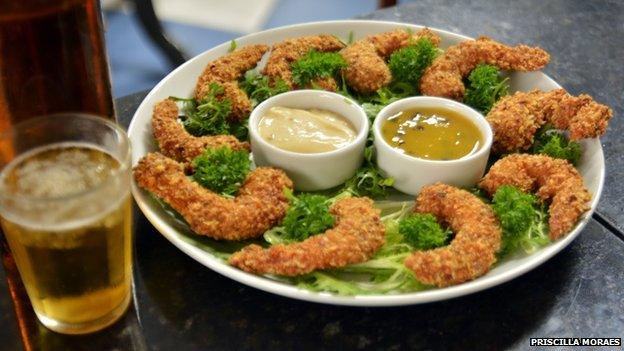
Prawns covered with crushed cashew nuts at Rio bar Bode Cheiroso
There is a saying in Brazil for how most people like their beer to be served - estupidamente gelada (stupidly cold).
And if you have ever experienced a scorchingly hot Brazilian day, you'll know that this is actually a wise thing. You really do want your lager to be super-chilled in such climatic conditions.
While you can easily buy a cold beer from a supermarket or beach vendor, for many Brazilians their preferred port of call is still a boteco, the humble bar or pub.
Most botecos are small, family-run businesses, which, for reasons lost in the mists of time, don't actually serve draft beer. Instead the beer - always lager - typically comes in large 600ml bottles.
The idea is that friends share a bottle - or many - between them, which they drink while eating plates of petiscos (snacks).
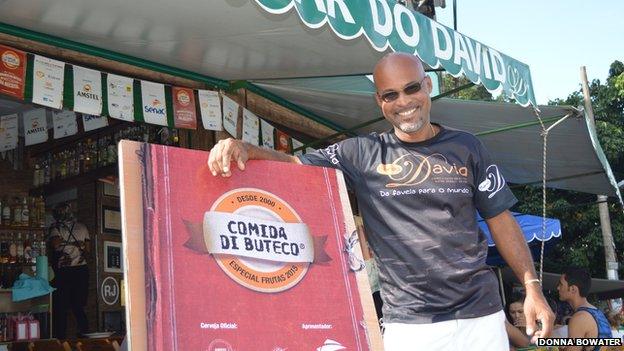
David Bispo says his bar has never looked back after doing well in the competition
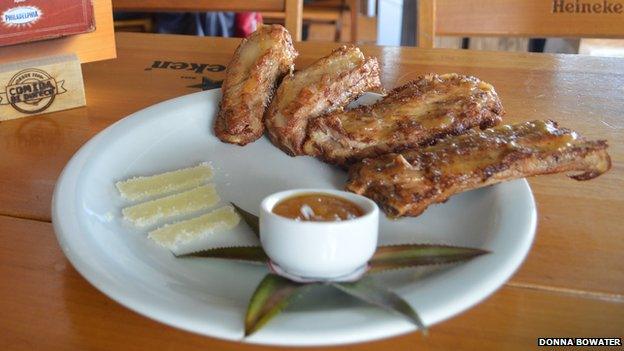
His bar, Bar do David, has entered pork ribs in this year's competition
The petiscos are typically something deep fried, such as breaded cod balls, or a pastel, which is a type of small pasty that also gets the hot oil treatment.
Imagine an authentic Spanish tapas bar, only with no sherry, and more use of a fryer.
With hundreds of botecos in Rio de Janeiro alone, the more ambitious ones try to boost their business by standing out from the crowd.
One way many do this is by entering an annual Brazil-wide competition to find the best botecos in the country.
Now in its 15th year, and free to enter, the Comida di Buteco contest judges bars according to four criteria - the quality of the food, the hygiene standards, the service, and crucially - the temperature of the beer.
Each boteco is judged by both a panel of judges, who visit anonymously and provide 50% of its final score, and by popular vote.
This year 45 bars in Rio entered the competition, which ran for a month until the middle of May. Each puts forward one dish upon which their food should be marked.
Botecos that take part generally enjoy a big boost in trade during the four weeks of the event, and then over the longer term if they win a prize.
Crystallised pineapple
David Bispo, owner of boteco Bar do David, says that entering Comida di Buteco "transformed" his business.
The 43-year-old opened his bar five years ago when he found himself out of work.
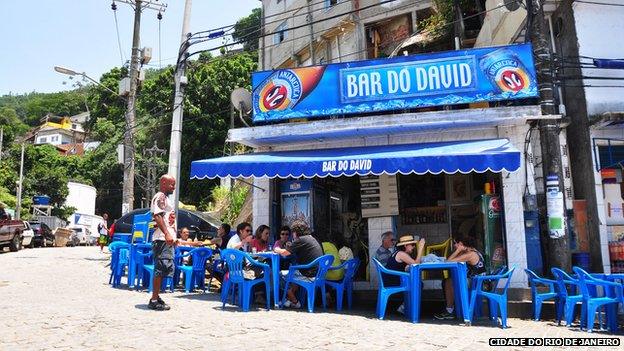
Bar do David attracts tourists despite being located in a favela
A fisherman by trade, and unable to find a job at the time, he decided that launching a bar serving food was his best option.
"Food is something people have to buy every day, so it generates income every day," he says. "You probably haven't bought any clothes today, but you've probably bought food."
So in 2010 he launched Bar do David in the Chapeu Mangueira favela or shanty town, which clings to a steep hillside overlooking Rio's famous Copacabana beach.
A year earlier the favela had been "pacified" by the police and soldiers, who had driven out the criminal gangs, so Mr Bispo was confident that it was now a good spot in which to open his bar.

Police and soldiers are continuing to 'pacify' Rios favelas, which number more than 1,000
So with his sisters helping out in the kitchen, his boteco opened its doors. Instead of just selling the typical pestiscos, Mr Bispo decided to also serve traditional Brazilian home-cooked dishes, such as feijoada, a thick bean and meat stew.
"These are the recipes that existed in my home," says Mr Bispo. "[In essence] what we did was open our home to the public."
In the bar's first year of business, Mr Bispo decided to enter Comida di Buteco, putting forward a similar stew to be judged.
The restaurant won an award, and Mr Bispo says its business shot up, and stayed up.
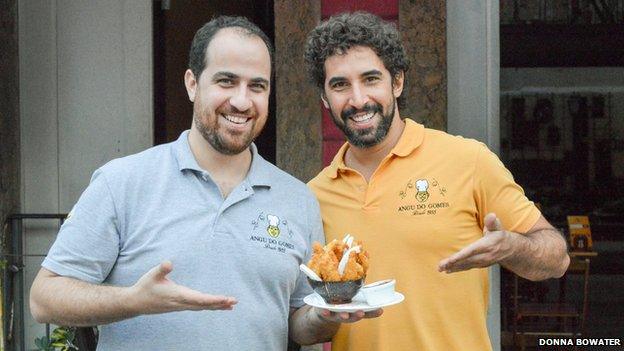
Marcelo Klang (left) of Angu do Gomes says business has grown by 20%
The theme of this year's Comida di Buteco competition is "fruit", and Mr Bispo has entered with a dish of pork ribs served with a pineapple jam with mint and chilli, finished with crystallised pineapple.
He says that the dish has been so popular with his customers that he had to buy more than a tonne of raw ribs.
And with the 2015 results just in, Mr Bispo's bar was judged to be the third best in Rio.
Fish goujons
The competition was originally set up by a radio station in the city of Belo Horizonte, which is known as the "pub capital of Brazil".
Today the contest is run by a small private company, which pays for the event by securing a number of sponsors, including potato crisp business Lay's, which is part of Pepsi, and food group Kraft.
Another Rio boteco that entered this year's competition is Angu do Gomes, located in the city's downtown area.
The bar, which traces its origin back in 1955, is still run by the same family, but it can certainly no longer describe itself as a small operation.
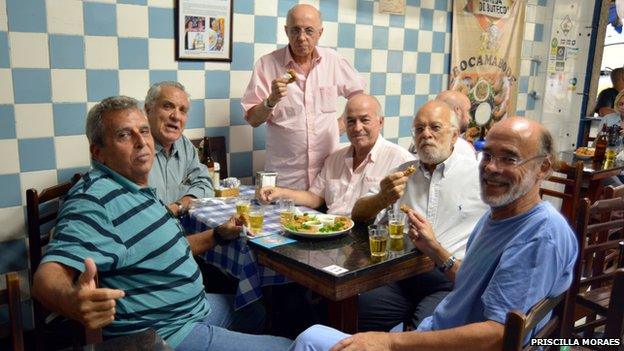
Rio's bar culture is centred on the snacks people can enjoy with their beer
Instead it can seat 250 people over three floors.
Over the month of the competition the boteco's trade increased by 20%, according to co-owner Rigo Duarte, a grandson of the founder.
The 33-year-old says this was a welcome boost, as it can often be difficult for bars to make money in Rio, especially during the summer months - December to February - when people want to go to the beaches instead.
Mr Duarte, whose food entry in the competition was fish goujons with coconut and a berry sauce, adds that the event was a good way for him to meet other participants, and share ideas.
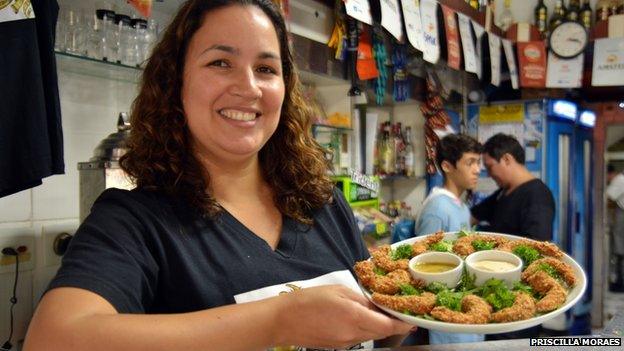
Emanuelle Braga Duarte Ribeiro is hoping that the competition will lead to repeat custom
He adds: "The thing about the competition isn't to win, but to participate."
Sadly Angu do Gomes didn't win an award this year, but Bode Cheiroso, a boteco close to Rio's giant Maracana football stadium, has just been voted the fourth best in Rio.
Co-owner Emanuelle Braga Duarte Ribeiro, 38, says its business tripled during the month of the competition, as hungry diners flocked to try its entry dish of prawns covered with crushed cashew nuts, served with a passion fruit sauce.
"We typically make 2,000 reals ($636; £435) a day, but when the competition was on it was 6,000," she says.
"And we are hoping for return custom of 30%. If at least 30% of the people who came to the bar during the competition come back, we'll be super happy."